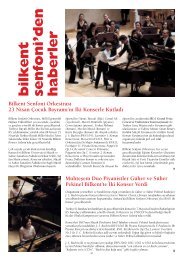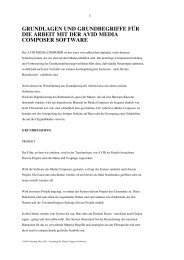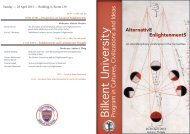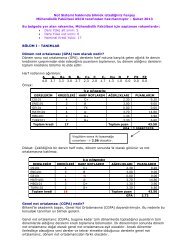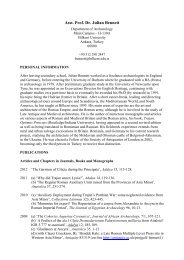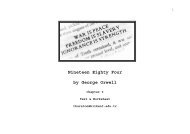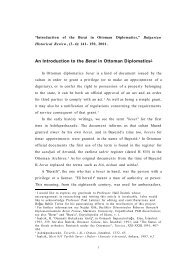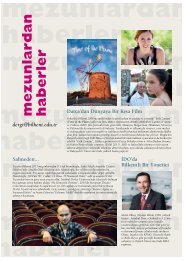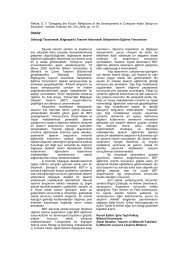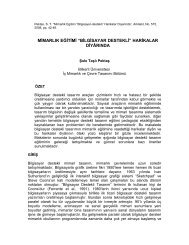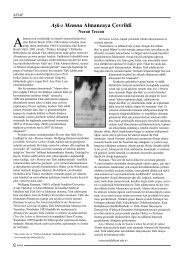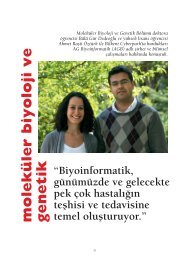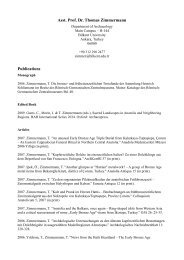German mathematicians in exile in Turkey ... - Bilkent University
German mathematicians in exile in Turkey ... - Bilkent University
German mathematicians in exile in Turkey ... - Bilkent University
Create successful ePaper yourself
Turn your PDF publications into a flip-book with our unique Google optimized e-Paper software.
1. Introduction<br />
<strong>German</strong> <strong>mathematicians</strong> <strong>in</strong> <strong>exile</strong> <strong>in</strong> <strong>Turkey</strong> 433<br />
The year 1933 was a turn<strong>in</strong>g po<strong>in</strong>t <strong>in</strong> the history of higher education system and a fortiori<br />
of science <strong>in</strong> <strong>Turkey</strong>. Merely 10 years after the formation of the Turkish Republic, the<br />
system of higher education went through a radical transformation, as part of a series of revolutionary<br />
reforms carried out under the leadership of Mustafa Kemal Atatürk <strong>in</strong> the political,<br />
social, legal and cultural doma<strong>in</strong>s. The aim of these reforms that ranged from<br />
abolish<strong>in</strong>g the caliphate to the adoption of Western legal codes and the Lat<strong>in</strong> alphabet,<br />
was to modernize the Turkish society, and education was seen as a key element for the success<br />
of modernization. As a result, Darülfünun—the only exist<strong>in</strong>g university <strong>in</strong> the country<br />
at the time—was closed down on the 31st of July <strong>in</strong> 1933, and Istanbul <strong>University</strong> was<br />
founded literally the next day. The academic reasons beh<strong>in</strong>d this were detailed <strong>in</strong> the<br />
Malche report written upon the <strong>in</strong>vitation of the Turkish government by Albert Malche,<br />
a professor of pedagogy at the <strong>University</strong> of Geneva. Accord<strong>in</strong>g to the report, Darülfünun<br />
was an outdated teach<strong>in</strong>g <strong>in</strong>stitution that produced no orig<strong>in</strong>al research and publication<br />
and that its enormous autonomy turned it <strong>in</strong>to a closed <strong>in</strong>stitution that had lost touch with<br />
the rest of the society [Widmann, 1999, 75–76]. Thus, <strong>in</strong> the eyes of the reformers it was necessary<br />
to turn it <strong>in</strong>to a modern higher <strong>in</strong>stitution of learn<strong>in</strong>g and research. However, these<br />
were not the only reasons for abolish<strong>in</strong>g Darülfünun; there was also a political motivation<br />
beh<strong>in</strong>d it. Resßit Galip, who was the masterm<strong>in</strong>d of the reform and the m<strong>in</strong>ister of education<br />
at the time, publicly accused Darülfünun professors of not embrac<strong>in</strong>g the massive reforms<br />
of the young Republic enthusiastically [Bilsel, 1943, 34–35]. It is therefore small wonder that<br />
the found<strong>in</strong>g of Istanbul <strong>University</strong> meant at the same time a liquidation of the exist<strong>in</strong>g<br />
faculty at Darülfünun: 157 out of 240 faculty members were dismissed from their positions,<br />
and 71 of those were full professors [Bilsel, 1943, 37].<br />
The very year Istanbul <strong>University</strong> was founded, Hitler came to power <strong>in</strong> <strong>German</strong>y, and a<br />
forced exodus of thousands of <strong>German</strong> academics began. While most of them went to the<br />
USA, a good many of them came to <strong>Turkey</strong>. In May of 1933, Malche <strong>in</strong>formed Philipp<br />
Schwartz, who was the <strong>in</strong>formal leader of a group of <strong>German</strong> scholars <strong>in</strong> <strong>exile</strong> <strong>in</strong> Zurich,<br />
of the plans of the Turkish government. Schwartz went to <strong>Turkey</strong> and carried out the negotiations<br />
with Turkish officials, which resulted <strong>in</strong> the hir<strong>in</strong>g of 30 full professors <strong>in</strong> July of<br />
the same year. 2 Accord<strong>in</strong>g to the most reliable sources, 52 full professors, 50 of whom were<br />
<strong>German</strong> and 2 of them were Austrian, taught at Istanbul <strong>University</strong> as emigrants between<br />
1933 and 1945. Of these 52 professors, 16 taught at the Faculty of Medic<strong>in</strong>e, 15 at the<br />
Faculty of Sciences, 14 at the Faculty of Letters, and 7 at the Faculty of Law; <strong>in</strong> addition,<br />
there were about 80 assistants, technicians, lab technicians and nurses (extracted from<br />
[Dölen 2010, vol. 3, 500–506; Widmann, 1999]. Several other <strong>German</strong> and a number of<br />
British, French, Hungarian and Swiss professors came to teach at Istanbul <strong>University</strong><br />
but not as emigrants. Thus, Istanbul <strong>University</strong> was truly a cosmopolitan <strong>in</strong>stitution dur<strong>in</strong>g<br />
the 30s and the early 40s.<br />
The most famous of the <strong>German</strong> scholars were <strong>mathematicians</strong> Richard von Mises and<br />
William Prager, astronomer Erw<strong>in</strong> F<strong>in</strong>ley Freundlich, physicist Arthur von Hippel, economist<br />
Fritz Neumark, philosopher of science Hans Reichenbach, romanists Leo Spitzer and<br />
2<br />
The breathtak<strong>in</strong>g story of this episode of history is well-known. See [Schwartz, 2003; Widmann,<br />
1999].




